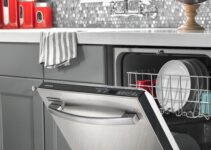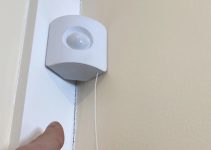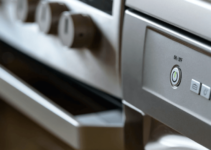Have you ever noticed a humming noise coming from your refrigerator and wondered why it’s making that sound? Well, you’re not alone, as many people experience this issue at some point.
In most cases, a humming refrigerator is not a cause for concern, but it is essential to understand the possible reasons behind the noise so you can determine if there is a need for professional intervention.
There are several factors that could contribute to a humming refrigerator, ranging from the increased usage of the ice maker during hot weather to the need for cleaning the condenser coils. Sometimes, objects blocking air vents inside the fridge or freezer might also cause a humming sound. Additionally, a loud humming noise could also be due to a damaged fan blade, defective fan motor, or even a failing compressor. It’s crucial to identify and address the problem timely to prevent potential damage to your appliance.
By understanding the possible causes of a humming refrigerator, I can take the appropriate steps to either fix the issue myself or call in a professional for help. Keeping a keen ear out for unusual sounds from your refrigerator can help you maintain it in good working condition and extend its lifespan.
How To Stop Refrigerator From Buzzing – Common Problems and Solutions
Here are some of the common problems that make the refrigerator hum.
#1 Failing Compressor
One possible reason for a humming refrigerator is a failing compressor. I know that the compressor can produce a humming noise when it’s struggling to maintain proper temperature. In this case, the best course of action is to have a professional technician inspect it and determine if it needs repair or replacement.
#2 Blocked Air Vent
Another issue that I would consider is a blocked air vent. When debris or ice accumulates inside the air vent, the circulation of cold air can be interrupted, leading to a humming sound. To remedy this, I would regularly clean the air vents to prevent any blockages.
#3 Damaged Fan Blade
If the problem persists, I might suspect a damaged fan blade. When the fan blade is damaged or off-balance, it can cause the motor to work harder and produce a humming noise. In this scenario, I would inspect the fan blades for any signs of wear or damage and replace them if necessary.
#4 Dirty Condenser Coils
Another common culprit is dirty condenser coils. When dirt accumulates on the condenser coils, it can impair their ability to dissipate heat, forcing the refrigerator to work harder and create a humming noise. To fix this issue, I would clean the condenser coils every few months using a soft brush and vacuum cleaner.
#5 Water Inlet Valve
Lastly, a malfunctioning water inlet valve could also be responsible for the humming sound. This valve controls the flow of water into the ice maker or water dispenser. If it becomes noisy or starts to leak, I would probably need to replace the valve.
Humming Refrigerator Troubleshoot
When it comes to diagnosing and troubleshooting refrigerator noises, I follow a quick troubleshooting guide to identify the source of the problem.
- First, I check if the refrigerator is level on the ground because uneven legs can cause a humming noise. If necessary, I adjust the legs and monitor the noise. One possible cause of humming can be air vents blocked by items inside the fridge or freezer. I make sure that nothing is obstructing the air vents and that there are no objects too close to them, which can disrupt proper airflow and create the humming sound.
- One common reason for a humming refrigerator is damaged fan blades. The circulation fans that move air throughout the fridge can produce a humming noise if they become damaged. I inspect the fan blades for any signs of damage and replace them if needed. To do so, I ensure the fridge is unplugged and carefully remove the blades. A year and model-specific manual can be helpful for specific guidance on removing the blades.
- Another potential source of humming noise is a worn out condenser fan motor. Over time, the bearings inside the motor can wear and cause noise. If I find that the fan blades are not the issue, I investigate the condenser fan motor.
- Remove any visible dirt and debris from the condenser area. If the motor is still noisy after cleaning, I consider replacing it. A professional repair technician can provide an accurate assessment and fix the issue.
- If my refrigerator has an ice maker, I listen for unusual humming noises coming from it. I ensure that the ice maker is functioning properly and check for signs of damage or debris that could be causing the noise.
Preventive Measures for a Humming Refrigerator
- Regular cleaning and maintenance of the refrigerator.
- Proper positioning of the refrigerator – ensuring it’s not placed directly against the wall or other appliances, which can cause humming or vibration noises.
- Checking and adjusting the refrigerator’s feet for balance to prevent vibrations.
- Proper arrangement of items inside the refrigerator, ensuring that they are not touching the interior walls and causing noise.
- Replacing or repairing worn-out or faulty components promptly.
- Ensuring the refrigerator is not overloaded as this may cause the motor to overwork and produce a humming sound.
Normal Sounds of Your Refrigerator
Refrigerators, like any other machine, aren’t silent operators. There’s a symphony of sounds that your refrigerator produces during its normal operation, and understanding these can give you peace of mind and help in identifying when something’s amiss.
For example, you may hear a soft humming or buzzing, which is typically just the sound of the refrigerator’s compressor. Similarly, a gentle whooshing sound can be heard when the fridge is circulating air to maintain the set temperature. You might also hear occasional pops or cracks; these are completely normal too, as they usually indicate that your refrigerator is going through its automatic defrost cycle.
However, if these sounds become louder, more frequent, or are accompanied by other issues like temperature changes or leaks, it could be a sign of trouble. Distinguishing normal operational sounds from potentially problematic noises is crucial in maintaining the health of your refrigerator and tackling issues in their early stages. If ever in doubt, don’t hesitate to reach out to a professional appliance repair service.





